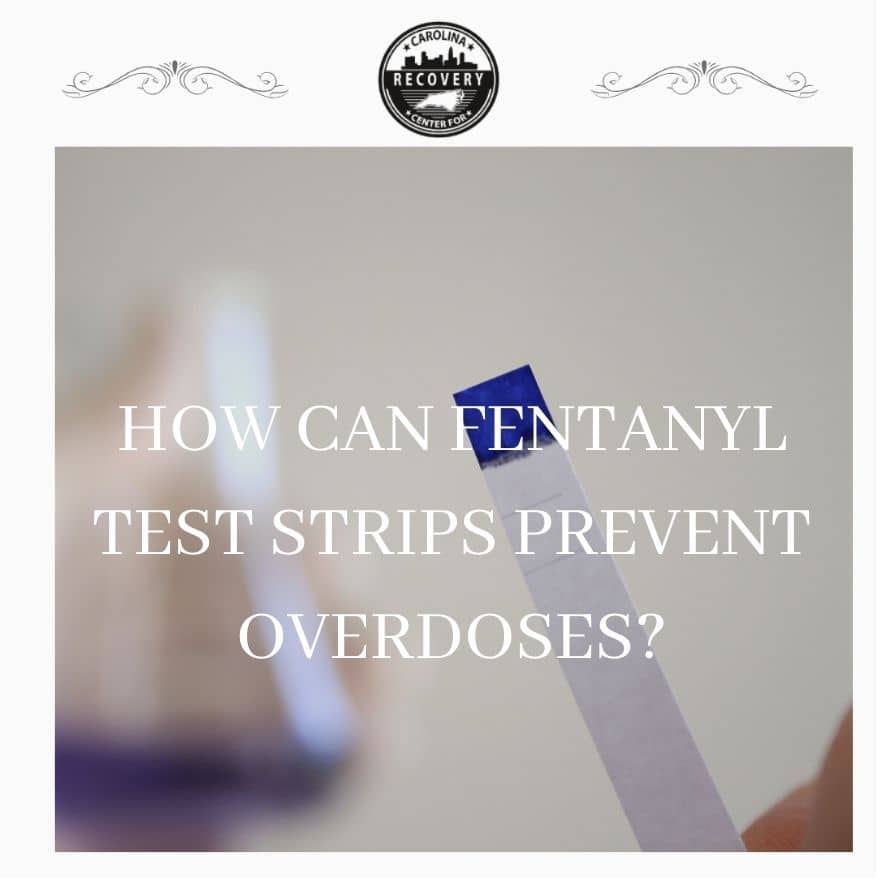How Can Fentanyl Test Strips Prevent Overdoses in North Carolina?

Medically Verified: 2/1/24
Medical Reviewer
Chief Editor

All of the information on this page has been reviewed and verified by a certified addiction professional.
Fentanyl is a synthetic opioid that poses life-threatening consequences to those who use it. The drug is 50 to 100 times stronger than other opioids like heroin and morphine. Typically, fentanyl is prescribed to patients with severe, treatment-resistant pain conditions. However, cities across America have noticed an increase in illegal fentanyl use.
The most concerning aspect of illegal fentanyl use is that the majority of users are not seeking out fentanyl on purpose. Illegal drug manufacturers and drug dealers are lacing other street drugs with fentanyl. Most commonly, counterfeit pills that are sold as oxycodone and alprazolam (Xanax) have been found to contain lethal amounts of fentanyl. This has caused a rise in fatal drug overdoses across the nation.
The CDC reports that 64% of the nation’s drug overdoses between May 2020 and April 2021 resulted from fentanyl abuse.[1] In North Carolina alone, there were 3,595 drug overdoses in 2021.[2]
As fentanyl overdose rates rise, experts have been searching for an effective preventative measure to keep communities safe. One element that can help the opioid crisis in America is the use of fentanyl test strips to help prevent opioid overdose.
What Are Fentanyl Test Strips?
Fentanyl test strips were originally created for detecting the presence of fentanyl in an individual’s urine and were used in urinalysis drug tests. However, research has shown that fentanyl test strips are effective in detecting the presence of fentanyl in drug samples before an individual ingests them.
Harm reduction experts have begun suggesting drug users use fentanyl test strips to test their drugs before they consume them. This could help individuals avoid accidental fentanyl overdoses, thereby lowering the national and local fentanyl death toll.
Fentanyl test strips were created in 2011 by a biotech company known as BTNX. These testing strips have been distributed to harm-reduction sites across the country, where volunteer workers provide drug users with safe needles and resources for recovery for free. However, it is possible to purchase fentanyl test strips without attending a harm-reduction site.
Thankfully, fentanyl testing strips are cheap, costing only $1 each. Additionally, they are easy to use and small enough to conceal in a wallet or purse.
How Do Fentanyl Test Strips Work?
Fentanyl test strips are easy to use and becoming more accessible to everyone.
To use a fentanyl test strip, an individual must dissolve a small amount of a substance in water. Once the substance is dissolved, the test strip is dipped into the solution for 15 seconds.
The test strip should be placed on a flat surface for up to 5 minutes until results appear. If only one line appears on the strip, fentanyl is present in the substance and it should not be consumed. If two lines appear, the substance is free of fentanyl.[3]
The Importance of Preventing Fentanyl Overdoses
The majority of fentanyl overdoses are due to illicit drugs being laced with fentanyl and sold as pills like oxycodone, Xanax, and even powdery substances like cocaine. Fentanyl is extremely potent, with small amounts of the substance being lethal in many cases. Because of the frequency of illicit drug use in North Carolina, it is extremely important to explore new ways of preventing fentanyl overdoses.
Important North Carolina drug abuse statistics to consider include:[2,4]
- Between 2000-2020, over 28,000 people in North Carolina lost their lives to a drug overdose.
- In 2020, 8 people in North Carolina died of a drug overdose each day.
- Robeson County in North Carolina saw the highest amount of overdoses in the State, with a rate of 495 per 100,000 people.
- By mid-December 2021, Cumberland County EMS personnel responded to 1,951 overdose calls.
Because drug overdoses – specifically fentanyl overdoses – are rampant in North Carolina, it’s important to find preventative measures that are accessible to everyone. Fentanyl test strips could be the solution to the opioid epidemic in North Carolina and the rest of the nation.
Signs of a Fentanyl Overdose
Another key part of preventing fentanyl-related deaths in North Carolina is being educated on the signs of overdose. Fentanyl overdoses are reversible with the help of an opioid-reversal drug known as naloxone. However, the individual experiencing an overdose must be treated immediately, as the window of time between life and death is small when it comes to opioid overdoses.
The signs of a fentanyl overdose include:
- Drowsiness and dizziness
- Low blood pressure
- Nausea and vomiting
- The limpness of the body
- Changes in the size of pupils
- Clammy and cold skin
- The blueness of lips and fingernails
- Slowed, shallow, or stopped breathing
- Decreased heart rate ‘
- Loss of consciousness
- Coma
If you or someone you love displays the signs of a fentanyl overdose, contact emergency medical services immediately and utilize naloxone if possible.
Finding Help for Opioid Addiction in North Carolina
If you or a loved one suffer from opioid addiction in North Carolina, it’s time to seek professional help. With the rise of fentanyl-laced opioid drugs, addiction to illicit drugs has become even more lethal.
Thankfully, addiction treatment programs like Carolina Recovery Center are here to help. With a combination of evidence-based therapies, holistic treatment, and a supportive environment, Carolina Recovery Center can provide you with the tools you need to succeed.
Contact us today for more information on how to get help for opioid addiction.
References:
- https://www.cdc.gov/mmwr/volumes/70/wr/mm7050e3.htm?s_cid=mm7050e3_e&ACSTrackingID=USCDC_921-DM71855&ACS
- https://www.northcarolinahealthnews.org/2022/01/25/fentanyl-is-everywhere-increasing-overdoses-in-the-south/
- https://portal.ct.gov/-/media/Departments-and-Agencies/DPH/AIDS–Chronic-Diseases/Prevention/DPH_FentanylTestStrips.pdf
- https://www.ncdhhs.gov/about/department-initiatives/overdose-epidemic

